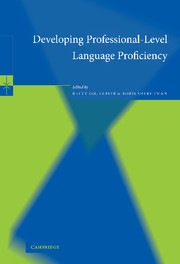Book contents
- Frontmatter
- Contents
- Notes on contributors
- Foreword
- Acknowledgments
- I Principles, practices, and theory
- II Programs
- 3 Contexts for advanced foreign language learning: a report on an immersion institute
- 4 Bridging the gap between language for general purposes and language for work: an intensive Superior-level language/skill course for teachers, translators, and interpreters
- 5 Learning Chinese in China: programs for developing Superior- to Distinguished-level Chinese language proficiency in China and Taiwan
- 6 Developing professional-level oral proficiency: the Shekhtman Method of Communicative teaching
- 7 The LangNet “Reading to the Four” Project: applied technology at higher levels of language learning
- 8 In the quest for the Level 4+ in Arabic: training Level 2–3 learners in independent reading
- 9 Teaching high-level writing skills in English at a Danish university
- 10 Heritage speakers as learners at the Superior level: differences and similarities between Spanish and Russian student populations
- 11 Teaching Russian language teachers in eight summer Institutes in Russian language and culture
- III Learners and users
- References
- Index
4 - Bridging the gap between language for general purposes and language for work: an intensive Superior-level language/skill course for teachers, translators, and interpreters
Published online by Cambridge University Press: 03 December 2009
- Frontmatter
- Contents
- Notes on contributors
- Foreword
- Acknowledgments
- I Principles, practices, and theory
- II Programs
- 3 Contexts for advanced foreign language learning: a report on an immersion institute
- 4 Bridging the gap between language for general purposes and language for work: an intensive Superior-level language/skill course for teachers, translators, and interpreters
- 5 Learning Chinese in China: programs for developing Superior- to Distinguished-level Chinese language proficiency in China and Taiwan
- 6 Developing professional-level oral proficiency: the Shekhtman Method of Communicative teaching
- 7 The LangNet “Reading to the Four” Project: applied technology at higher levels of language learning
- 8 In the quest for the Level 4+ in Arabic: training Level 2–3 learners in independent reading
- 9 Teaching high-level writing skills in English at a Danish university
- 10 Heritage speakers as learners at the Superior level: differences and similarities between Spanish and Russian student populations
- 11 Teaching Russian language teachers in eight summer Institutes in Russian language and culture
- III Learners and users
- References
- Index
Summary
A person decides to become a language learner for a variety of reasons: to be able to read the literature of a given language in its original form, to travel and discover other cultures, to obtain a better understanding of the world, to meet people and be able to understand them, to increase business opportunities, to exchange ideas with colleagues and friends, to communicate better across language barriers. For most people, the goal is to be able to communicate. Others put their language knowledge at the center of their profession and become language teachers, translators, interpreters, or members of the diplomatic corps of their country.
The courses described here were developed by the authors and taught at the Monterey Institute of International Studies from 1994 through 2000, following a 1993 pilot course in French. Since even Superior-level language learners encounter difficulties in using their language in a professional environment, the Spanish and French Summer Intensive Bridge courses were conceived with the goal of developing the proficiency needed to work professionally in the fields of teaching, translation, and interpreting. This goal differentiates them from Advanced-level summer courses for language enhancement (e.g., summer courses in Spanish universities for English-speaking teachers of Spanish).
The initial objectives were to bring students who had been accepted into the two-year Master's program to the proficiency level necessary to perform in the Translation and Interpreting (T&I) MA program and to offer professionals in the T&I fields the opportunity to enhance their foreign language abilities.
- Type
- Chapter
- Information
- Developing Professional-Level Language Proficiency , pp. 77 - 95Publisher: Cambridge University PressPrint publication year: 2002
- 19
- Cited by

